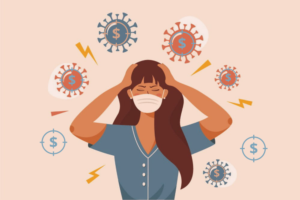The COVID-19 pandemic has affected every aspect of our lives, from the way we work to the way we socialize. One issue that has emerged during this time is the idea of a “COVID cautious tax.” This term is related to the concept of a “disability tax,” where disabled people pay more for basic services because they have to add accessibility measures. In the same way, those who continue to be hypervigilant about COVID-19 take on a greater burden for society.
@claudiaalicklove The Covid cautious tax is the additional labor and financial cost taken by individual citizens to create mitigations. Allowing corporations to profit from society as a whole, not taking proper precautions. they profit while we pay. mamaskupo#covidcautious
♬ original sound – Claudia Alick
The COVID cautious tax refers to the additional expenses and burdens that people who are taking extra precautions to avoid COVID-19 face. This could include things like buying more expensive masks, investing in air purifiers, or paying for more expensive groceries because they are ordering delivery instead of going to the store. In essence, the COVID cautious tax is the price of maintaining a higher level of caution and safety during the pandemic.
The issue with the COVID cautious tax is that it disproportionately affects those who are already vulnerable or marginalized. For example, people with pre-existing health conditions or disabilities may be more cautious because they are at higher risk of severe illness from COVID-19. However, they may also be more likely to experience financial hardship or difficulty accessing the resources they need to protect themselves. Similarly, low-income individuals or those who work in jobs with high exposure risks may be more cautious but have less financial flexibility to absorb the additional expenses.
Furthermore, the COVID cautious tax is exacerbated by the mistaken belief that COVID-19 is not a serious threat or that mitigation measures are unnecessary. When the general public does not take the pandemic seriously, it puts additional pressure on those who are taking extra precautions. For example, if someone is the only person in their workplace wearing a mask or the only one insisting on social distancing, they may be ostracized or even penalized for their caution. This can create a vicious cycle where people who are cautious are penalized for their actions, which in turn makes it harder for others to justify being cautious.
Ultimately, the COVID cautious tax is a symptom of the larger social and economic inequities that have been highlighted by the pandemic. It is a reminder that the burden of protecting ourselves and our communities should not fall solely on individuals, but on society as a whole. Governments and institutions need to step up to ensure that everyone has access to the resources and support they need to stay safe during the pandemic. This could include things like subsidies for masks or air purifiers, additional sick leave for essential workers, or greater support for telework and remote learning.
In conclusion, the COVID cautious tax is a real issue that highlights the need for greater social and economic equity during the pandemic. While individuals can take steps to protect themselves and their communities, it is not fair or sustainable to expect them to bear the entire burden of doing so. Governments and institutions must step up to provide the necessary resources and support to ensure that everyone can stay safe during this challenging time. Only by working together can we overcome the challenges posed by the pandemic and emerge stronger and more resilient than ever before.

